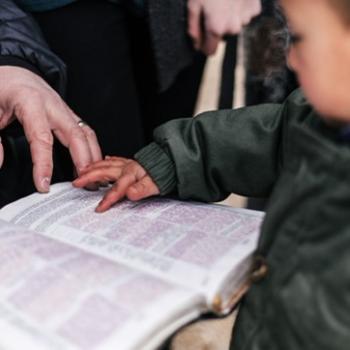It has been interesting to gauge the responses of people during months of lockdowns, regulated gatherings, and mask mandates. Ours is a world that thinks little of serious matters like death and eternality. We paint a veneer over these things by assuming a certain level of safety on every given day, as if we are owed the predictable. Each of us steps out of the shower assuming we will live long enough to dry ourselves, don clothes for the day, and drive wherever we are going—and that all the while everyone else will drive equally as predictably. Yet when the pandemic struck people had to grapple with the very real truth that life itself isn’t predictable nor is it all that safe, and people haven’t handled that news all too well.
There are a multitude of reasons why this is so, but the baser instinct Covid has revealed is, for any lack of a better way to quantify it, a spirit of fear and a spirit of foolishness. People are afraid of dying. I will state that I believe this is a fundamentally appropriate response to death for those who do not know the peace and forgiveness of Christ. A spirit of foolishness has likewise been revealed in many who have no fear of death, yet simultaneously have no fear of God Himself. Theirs is, of course, the opposite reaction of those in abject fear where pride reigns. Though they rightly recognize any number of things can kill them, they fail to inquire of the condition of their souls before the holy and just God of all the earth.
Death to either group will not be a pleasant experience, where they slip from reality into a world of endless bliss in the presence of their Savior. They ought to be terrified at the prospect of losing whatever it is they cling to now, whether freedom or safety, simply because their life this side of eternity will be the best they ever have it and they shall have neither, if they fail to repent.
For many a Christian, this is a time revealing not only the things they have placed much stock in, which by design are purposed to fail them, but a shocking disregard of some of the most basic elements of Christian faithfulness. Gathering in person for church has become an optional endeavor. Some even go so far as to suggest that online sermons are an adequate replacement to gathering with the saints. For many in leadership, extra biblical mandates have been instituted from a position of self-derived authority rather than biblical authority. Singing is forbidden, congregants are turned away, consciences are bound where Scripture would give freedom of choice instead, and genuine human interaction is restricted—all for fear.
In many ways though I believe these problems have been evident within the broader church for some time. The Coronavirus pandemic has simply provided an opportunity for these things to be revealed. It has provided an excellent cover for unfaithfulness to the Great Commission, among many other things. Society has been moving in an insular direction for years and unfortunately the broader church has adopted a similar stance.
Gathering the family around the dinner table for a shared meal is an antiquated ideal for more than half of the country, no doubt for many even within the church. I have little doubts that some of that changed during the initial phase of lockdowns, when some discovered the benefits perhaps for the first time. However, I have sincere doubts this changed many people’s outlook on another oft-neglected pastime: practicing hospitality.
For many I would argue the pandemic has made things difficult, surely, through no fault of those still seeking to be hospitable during times such as these. For others though, I suspect this is another area of unfaithfulness that has long been present, which now finds an adequate line of reasoning that can be wrapped up under the guise of loving one’s neighbor. Interestingly enough though, Scripture doesn’t provide qualifications that hem and haw over the exceptions to the general rule. Instead, it simply calls the Christian to these areas of faithfulness, trusting that God Himself will bless their efforts as He remains sovereign over all. There is great personal risk involved in each and every day, but regardless of whatever circumstances we find ourselves in, the call upon the Christian is faithfulness.
My basic, short premise is that Christians, above and beyond all other people, should have ample reason to practice hospitality—especially when others are not. We should do this not simply for the fact that it is a command given (Rom. 12:13; 1 Pet. 4:9), but we have a unique opportunity to seize this good practice while others forfeit it. We have the ability to be known as a people who richly welcome believers and unbelievers alike into our homes and amply entreat them at our own personal cost. We can show them a warmth and presence many deny them. We can provide them with good food and drink, rich conversation, and the simple freedom to just enjoy one another’s company without all of the restrictions, double-standards, and expectations of reciprocity.
The over-arching point is that hospitality is a means of giving freely of one’s time, resources, energies, and more for the sake of others. It reflects God’s generosity with us, and as such, it is a means by which people may come to see His mercy and goodness (Ps. 67). The practice of entertaining strangers further shows the reality of our faith, so much so, that Christ Himself has said that by serving others, the saints serve Him. Vicariously, those who deny the practice of hospitality are said to deny Him (Matt. 25:34-46). We likewise promote the furtherance of the gospel by showing hospitality to those who have “gone out for the sake of the Name” (3 Jn. 1:5-8). We embody the practice of our Lord, where we see a common meal shared in several prominent passages in Scripture (Matt. 9:10-17; 14:13-21; 26:17-30; Jn. 21:1-14).
The ultimate goal in all of our practice in hospitality is to show them Christ, regardless of where they land on various social, political, and moral issues. In other words: our hospitality is gospel-focused and Christ-saturated. It has the ultimate aim of revealing the God who has dealt so kindly with us. In short: it is a true way we can love our neighbor, which Christ Himself has clearly explicated to us in precise detail how we might do so. For all the talks of what is said to be a love of one’s neighbor—it seems many have forgotten some of the most basic expressions of what that actually means.
The world is not safe. It never has been since the Fall and never will be until the day Christ returns. Every civilization known to man has dealt with the consequences of sin, especially as it relates to sickness and disease. The point is not to become so careless that every ounce of wisdom leaves the brain, but rather, that we simply operate as creatures who realize the time we have truly is as a vapor, here today and gone tomorrow. We ought not to let anything stand in the way of the mission of the church, part of which is undoubtedly found in the practice of hospitality. In an age where many are paralyzed in fear of what may come, we can be bold in proclaiming a fate worse than death, yet a blessed hope that is better than life as we currently know it.













